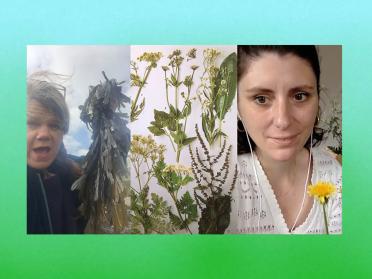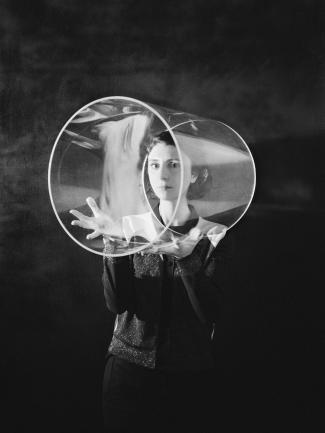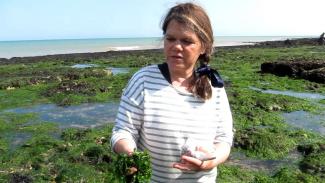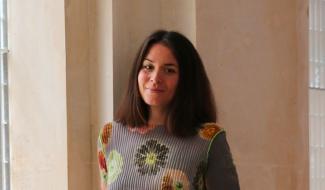
Marguerite Humeau, Weeds
Thursday 25 Jun 2020 from 5pm to 5:50pm
"Weeds" follows Marguerite Humeau's questioning about the upheavals that are shaking the world.
The investigation opens with an encounter between the artist and Lucia Stuart, an artist and expert in gathering, who tells the philosophy of the practice of foraging.
The video is followed by an interview with Rebecca Lamarche-Vadel, putting this approach into perspective within the artist's work.
This exploration is the starting point for Marguerite Humeau's residency at the Fondation Lafayette Anticipations starting in November 2020. On this occasion, the public will be invited to participate in several workshops with the artist devoted to the design of poetic and political gardens, in collaboration with numerous high school students and speakers (philosophers, botanists).
Marguerite Humeau breathes life into lost things, whether they be lifeforms that have become extinct or ideas that have disappeared from our mental landscapes. Filling gaps in knowledge with speculation and imagined scenarios, her aim is to create new mythologies for our contemporary era.
She received her MA from the Royal College of Art, London, in 2011.
Solo exhibitions of her work have been held at Lafayette Anticipations, Paris (2021); Jeu de Paume, Paris (2020); Kunstverein Hamburg (2019); Museion, Bolzano (2019); New Museum, New York (2018); Tate Britain, London (2017); Haus Konstruktiv, Zürich (2017); Schinkel Pavillon, Berlin (2017); Nottingham Contemporary (2016); and Palais de Tokyo, Paris (2016).
Humeau’s work has been featured in numerous group exhibitions, including Lafayette Anticipations (2024); Kunsthalle Basel (2021); the Istanbul Biennial (2019); Centre Pompidou, Paris (2019); MAMVP, Paris (2019); the High Line, New York (2017); Château de Versailles, France (2017); Kunsthal Charlottenborg, Copenhagen (2017); FRAC Midi- Pyrénées, Toulouse, France (2017); Serpentine Galleries, London (2014); and Victoria and Albert Museum, Sculpture Gallery, London (2014).
She was the director of Lafayette Anticipations in Paris, where she has curated the shows by Martine Syms, Neil Beloufa, the group show Coming Soon, Issy Wood, Cyprien Gaillard (also at Palais de Tokyo), Martin Margiela, Marguerite Humeau and Jean-Marie Appriou. She is currently preparing a solo show by Diego Marcon (2026).
In 2020 she was the curator of the Riga Biennial, "and suddenly it all blossoms", and director of the feature film based on the exhibition. From 2011 to 2019, she was curator at the Palais de Tokyo where she has presented, among others, the cartes blanches to Tomás Saraceno, ON AIR, and to Tino Seghal. She has also curated the exhibitions of Marguerite Humeau, Ed Atkins, Helen Marten and David Douard, as well as the group exhibition Le bord des mondes.
She regularly collaborates with international institutions, such as Art Explora, the MoMA PS1, Nottingham Contemporary, the Stedelijk Museum, Palais de Tokyo, or the Château de Versailles.
Rebecca Lamarche-Vadel regularly publishes in French and international journals and catalogs, and participates in seminars and juries in France and abroad.
Bibliographie
Albouy, Vincent. Faune des villes- 300 espèces qui vivent parmi nous. Delachaux., 2020.
Bachelard, Gaston. La poétique de l’espace. Édité par Gilles Hiéronomus. Presse Universitaires de France., 2020.
Clément, Gilles. Manifeste du tiers paysage. Sens et Tonka., 2014.
[EN] Darke, Rick, et Doug Tallamy. The Living Landscape: Designing for Beauty and Biodiversity in the Home Garden. Timber Press., 2014.
Ducerf, Gérard. L’encyclopédie des Plantes bio-indicatrices, Alimentaires et médicinales, Guide de diagnostic des sols. Promonature., 2010.
Ducerf, Gérard. Guide ethnobotanique de phytothérapie. Promonature, 2012.
Ducerf, Gérard, et Rémi Geneston. La flore des bonnes herbes. Promonature, 2020.
[EN] Dunnett, Nigel. Naturalistic Planting Design The Essential Guide. Filbert Press, 2019.
Escuder, Olivier. Plantes médicinales mode d’emploi. Eugen Ulmer Eds., 2007.
Fukuoka, Masanobu. La révolution d’un seul brin de paille, Une introduction à l’agriculture sauvage. Guy Trédaniel Editions., 2005.
[EN] Gagliano, Monica. Thus Spoke the Plant: A remarkable journey of groundbreaking scientifc discoveries and personal ecounters with plants. North Atlantic Books., 2018.
Giraud, Marc, Vincent Albouy, et François Lasserre. Les insectes en bord de chemin. Delachaux. Insectes et Autres Invertébrés, 2019.
Guillard, Valérie, et Dominique Roux. « De la pauvreté à l’exentricité: le glanage comme révélateur des marges de la consommation ». Sciences de l’Homme et Société, Gestion et Management, 48, no 3 (s. d.): 2014.
Mancuso, Stefano, et Alessandra Viola. L’intelligence des plantes. Traduit par Renaud Temperini. Albin Michel., 2018.
Marder, Michael. Plant- Thinking A philosophy of Vegetal Life. Columbia University Press., 2013.
Morton, Timothy. Dark Ecology: For a Logic of Future Coexistence. Columbia University Press., 2016.
Moutsie, et Gérard Ducerf. Récolter les jeunes pousses des plantes sauvages comestibles. Terran Editions., 2015.
O. Chris, C. Nicolai, et H. Riffaut. « Les glaneurs alimentaires. Rapport d’étude qualitative remis à la DIIESES pour le Haut-Commissariat aux solidarités actives contre la pauvreté ». Paris Centre d’étude et de recherche sur la philanthropie, 9 janvier 2009.
[EN] Oudolf, Piet, et Henk Gerritsen. Planting the Natural Garden. Timber Press., 2019.
Oudolf, Piet, Henk Gerritsen, et Noël Kingsbury. Jardins naturalistes-Les meilleures plantes vivaces. Traduit par Didier Willery. Eugen Ulmer Eds., 2020.
[EN] Oudolf, Piet, et Noël Kingsbury. Planting A new Perspective. Timber Press., 2003.
Oxley, George. La fleur au fusil, Nutrition, santé, climat: la science des plantes sauvages pour sauver l’homme. Alternatives. Manifesto, 2016.
Paddeu, Flaminia. « Déchets, mauvaises herbes et plantes sauvages, Géographie critique du glanage alimentaire urbain ». Echo Géo 47 (mars 2019): pp.1-20.
[EN] Robinson, William. The Wild Garden. Timber Press, 2009.
Sombrun, Corine. Mon initiation chez les Chamanes, Une parisienne en Mongolie. Pocket., 2019.
[EN] Steiner, Rudolf, et G. Adams. Agriculture Course: The birth of the Biodynamic Method. Rudolf Steiner Press., 2004.
Ubarrechena, Diana, George Oxley, et Gérard Ducerf. Manifeste gourmand des herbes folles: Se faire du bien en dégustant les plantes sauvages. Editions Toucan., 2013.
Wohlleben, Peter. La vie secrète des arbres. Les Arènes Eds., 2017.
[EN] Vegetal Politics: Belonging, practices and places. Routledge., 2015.
Filmographie
Agnès Varda, Les Glaneurs et la Glaneuse, 2000


